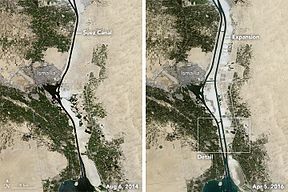New Suez Canal
| New Suez Canal | |
|---|---|

Old and New Suez Canal
|
|
| Specifications | |
| Length | 35 km (22 miles) |
| Locks | None |
| Status | Open |
| Navigation authority | Suez Canal Authority |
| History | |
| Original owner | Suez Canal Authority |
| Principal engineer | Egyptian Armed Forces (EAAF) |
| Other engineer(s) | 84 other companies |
| Construction began | 5 August 2014 |
| Date of first use | 6 August 2015 |
| Date completed | 9 December 2016 |
| Geography | |
| Branch of | Suez Canal (Length 193.30 km) |
The Arab Contractors
Orascom Construction Industries
The New Suez Canal (Egyptian Arabic: قناة السويس الجديدة Kanāt El Sewēs El Gedīda) is the name of a waterway project in Egypt, to expand the capacity of the existing Suez Canal.
The project adds a new 35-kilometre-long (22 mi) second shipping lane in the existing 164-kilometre-long (102 mi) canal, allowing for separated passing of ships in opposite directions. It also includes the deepening and expansion of a 37-kilometre-long (23 mi) section of the existing canal.
The enlarged capacity allows ships to sail in both directions at the same time over much of the canal's length. Beforehand, much of the canal was only one shipping lane wide, with limited wider basins for passing. This is expected to decrease waiting time from 11 hours to 3 hours for most ships, and to increase the capacity of the Suez Canal from 49 to 97 ships a day.
Technical difficulties initially arose, such as the flooding of the new canal through seepage from the existing canal. Nevertheless, work on the New Suez Canal was completed in July 2015. The channel was officially inaugurated with a ceremony attended by foreign leaders and featuring military fly-pasts on 6 August 2015, in accordance with the budgets laid out for the project.
Egyptian officials especially the chairman of the Suez Canal Authority, Vice-Admiral Mohab Mamish stated that the $8.2 billion project, which expands capacity to 97 ships per day, will more than double annual revenues to some $13.5 billion by 2023. That, however, would require yearly growth of 10%. A recent forecast from the IMF suggests that in the decade up to 2016 the annual rate of growth for global merchandise trade will have averaged 3.4%.
About 18 scientists writing in the academic journal Biological Invasions in 2014 expressed concern about the project impacting the biodiversity and the ecosystem services of the Mediterranean Sea. They called on Egypt to assess the environmental effects that the canal expansion could cause, a request echoed by the executive secretary of the Convention on Biological Diversity. Over 1,000 invasive species have entered the Mediterranean Sea through the Suez Canal since its original construction in the mid-19th century, with human activities becoming a leading cause of the decline of the sea's biodiversity, according to the European Commission's Joint Research Centre.
...
Wikipedia
